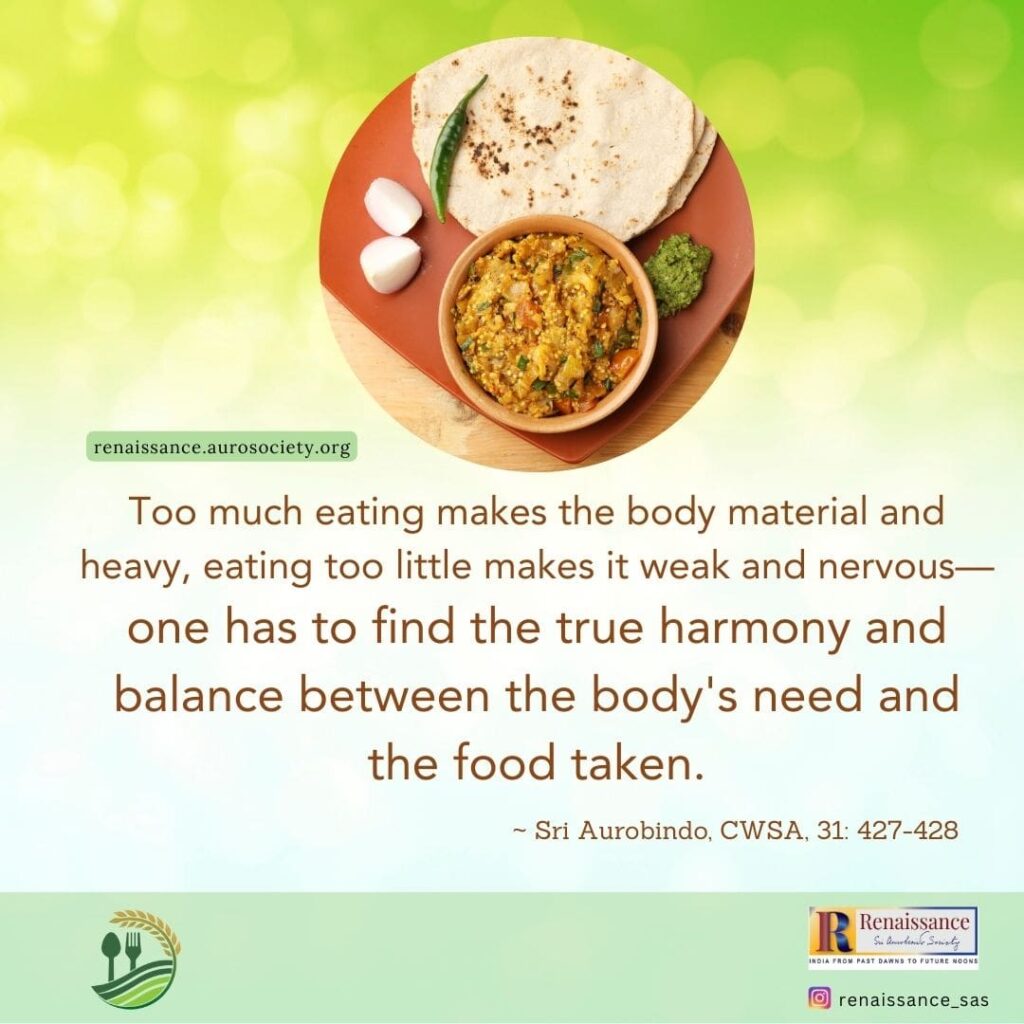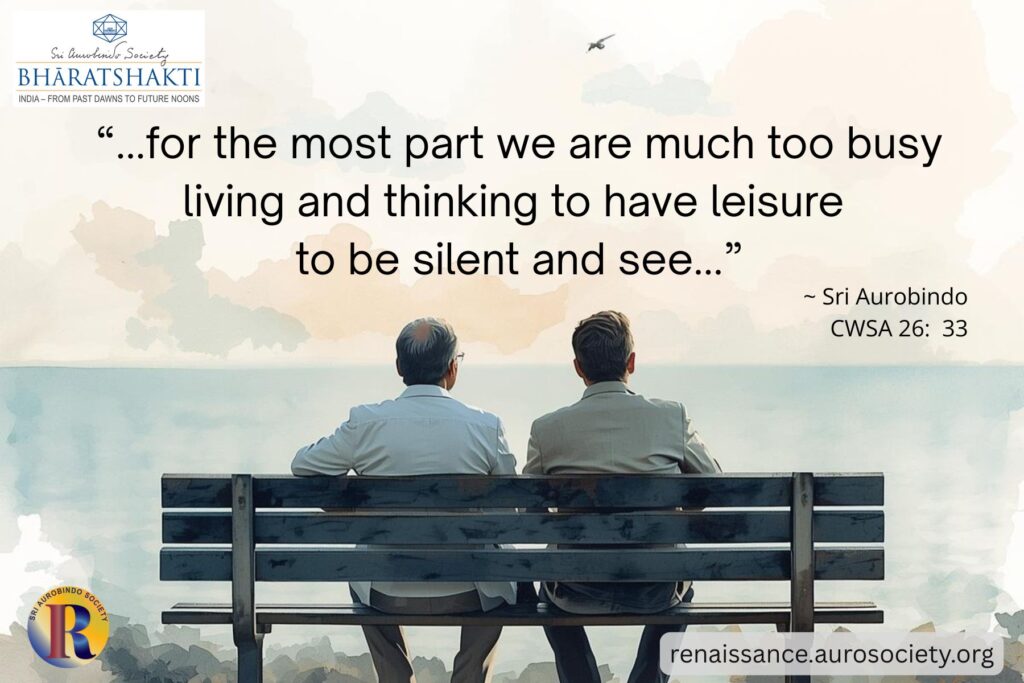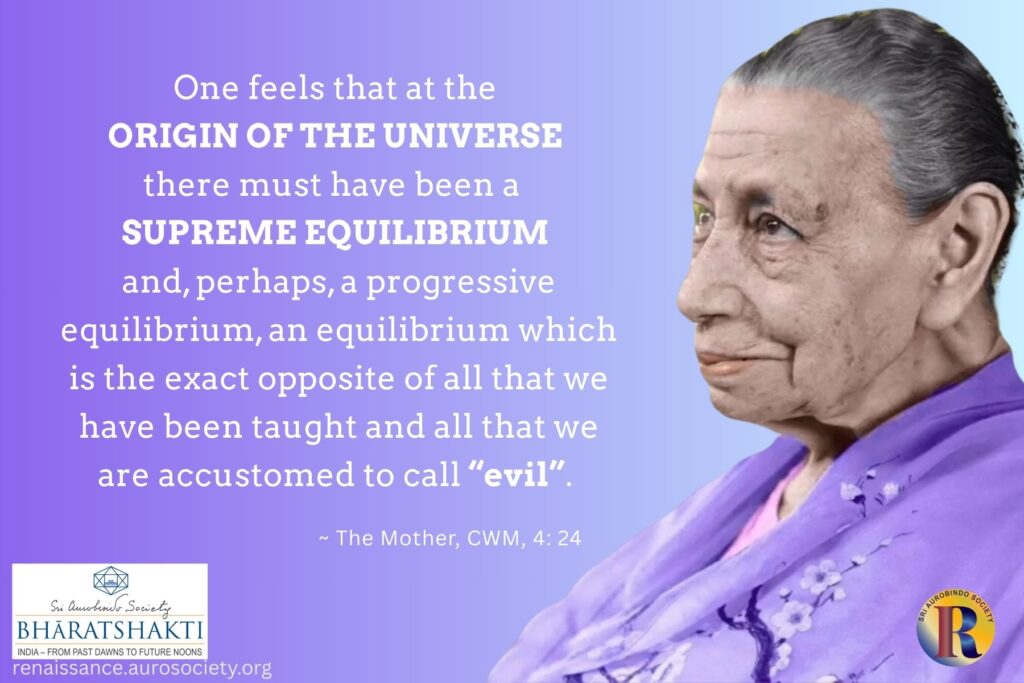Editor’s note: We feature here some selections from Sri Aurobindo’s letters regarding how to overcome desire and greed for food. We have made a few formatting revisions for the purpose of digital presentation, without altering the original text.

Two ways of conquering the desire for food
The vital of most people is of this kind [too weak to restrain its desires for pleasure], except in a few who are indifferent to sex or to food desire or to both, by temperament and nature.
There is always something in the lower vital which is recalcitrant and takes a pleasure in following its own way and disregarding the higher dictate, and there are always external forces hostile to the Yoga which try to take advantage of its obscurities, revolts and weaknesses.
Neither neglect this turn of the nature (food desire) nor make too much of it; it has to be dealt with, purified and mastered but without giving it too much importance.
There are two ways of conquering it—one of detachment, learning to regard food as only a physical necessity and the vital satisfaction of the stomach and the palate as a thing of little or no importance; the other is to be able to take without insistence or seeking any food given and to find in it (whether pronounced good or bad by others) the equal rasa, not of the food for its own sake, but of the universal Ananda.
But the latter comes usually only when one can live in the cosmic consciousness or rise into the Overmind—and for this you are not yet ready. So the first way is the one you should keep in view.

Put the food element in the right place in life, don’t concentrate on it
It is the attachment to food, the greed and eagerness for it, making it an unduly important thing in the life, that is contrary to the spirit of Yoga.
To be aware that something is pleasant to the palate is not wrong; only one must have no desire nor hankering for it, no exultation in getting it, no displeasure or regret at not getting it. One must be calm and equal, not getting upset or dissatisfied when the food is not tasty or not in abundance—eating the fixed amount that is necessary, not less or more. There should be neither eagerness nor repugnance.
To be always thinking about food and troubling the mind is quite the wrong way of getting rid of the food-desire. Put the food element in the right place in the life, in a small corner, and don’t concentrate on it but on other things.
Eat to maintain the body
It is a mistake to neglect the body and let it waste away; the body is the means of the sadhana and should be maintained in good order. There should be no attachment to it, but no contempt or neglect either of the material part of our nature.
In this Yoga the aim is not only the union with the higher consciousness but the transformation (by its power) of the lower including the physical nature.
It is not necessary to have desire or greed of food in order to eat. The Yogi eats not out of desire, but to maintain the body.
Do not trouble your mind about food.
Take it in the right quantity (neither too much nor too little), without greed or repulsion, as the means given you by the Mother for the maintenance of the body, in the right spirit, offering it to the Divine in you; then it need not create tamas.

The first thing to be attained about eating, is to get rid of the greed of food, the attachment and desire,—to take it only as a need of the body, to think little of it and not to allow it to occupy a big place in the life; also to be satisfied with what you get, not to hanker.
At the same time sufficient food should be taken, avoiding either deficiency or excess; an excessive coercion or nigraha in this respect (as opposed to reasonable control) often brings a reaction. One should go steadily, but not try to get too much done at once.
***
As for Sannyasis and food, Sannyasis put a compulsion on their desires in this and other matters—they take ascetic food as a principle; but this does not necessarily kill the greed for food, it remains compressed and, if the compulsion or principle is removed, it can come up again stronger than before—for compression without removal often increases the force of these things instead of destroying them.
***
. . . Greed for food has to be overcome, but it has not to be given too much thought. The proper attitude to food is a certain equality.
Food is for the maintenance of the body and one should take enough for that—what the body needs; if one gives less the body feels the need and hankers; if you give more, then that is indulging the vital. As for particular foods the palate likes, the attitude of the mind and vital should be, “If I get, I take; if I don’t get, I shall not mind.”
One should not think too much of food either to indulge or unduly to repress—that is the best.

Find the true balance between body’s need and the food taken
What is necessary is to take enough food and think no more about it, taking it as a means for the maintenance of the physical instrument only.
But just as one should not overeat, so one should not diminish unduly—it produces a reaction which defeats the object—for the object is not to allow either the greed for food or the heavy tamas of the physical which is the result of excessive eating to interfere with the concentration on the spiritual experience and progress.
If the body is left insufficiently nourished, it will think of food more than otherwise.
Also read:
Refining the sense of taste with no attachment to food
Exercise is always supposed to increase the appetite as the body needs more food to restore the extra expense of energy put out. Normally the more physical work the body has to do the more food it needs.
On the other hand mental work requires no increase of food—that has been ascertained scientifically by experiment. Hunger may increase by other causes, but when it coincides with the taking up of play or physical exercise of a strenuous character, that is sufficient to explain it. [. . .]
***

One can bring down the strength [from above], but it is also necessary to see that the body has sufficient food, sleep and rest—absence of these things strains the nerves and if the nerves are strained the body feels fatigue, becomes weakened. [. . .]
***
If these [practices of self-control] are done as moral virtues, they need not bring a spiritual state. It is only when they are observed as a spiritual discipline that they help—most of them, at least. A man may eat little and have no spirituality—but if he practises it as a means of self-mastery to get rid of the greed of food, then it helps.
Taste is not a bondage
It is no part of this Yoga to suppress taste, rasa altogether; so, if you found the ice-cream pleasant, that does not by itself invalidate the completeness of your progress.
What is to be got rid of is vital desire and attachment, the greed of food, being overjoyed at getting the food you like, sorry and discontented when you do not have it, giving an undue importance to it, etc.
If one wants to be a Yogin, it will not do to be like the ordinary man to whom food, sex and gain are nine-tenths of life or even to keep in any of these things the reactions to which vital human nature is prone. Equality is here the test as in so many other matters. If you can take the Ashram food with satisfaction or at least without dissatisfaction, that is already a sign that attachment and predilection are losing their old place in the nature.
***
Taste is no more a guilty thing than sight or hearing. It is the desire that it awakens that has to be thrown away.
It is possible to get rid of taste like Chaitanya, for it is something that depends on the consciousness and so inhibition is possible. In hypnotic experiments it is found that suggestion can make sugar taste bitter or bitter things sweet. . . .
There is a certain usually fixed relation between the consciousness in the palate and the guṇa of the food, but the consciousness can alter the relation if it wants or inhibit it altogether. There are Yogis who make themselves insensitive to pain also and that too can be done by hypnosis.
Another method is to find all things good to the taste without attachment to any.

***
No—it [taste] is not a bondage, if there is no attachment. Taste is natural and quite permissible so long as one is not the slave of the palate.
Certainly, the enjoyment of taste can be offered up. I don’t know that there is any fruit of eating in the sense of the phrase in the Gita.
As to the question of practising to take all kinds of food with equal rasa, it is not necessary to practise nor does it really come by practice. One has to acquire equality within in the consciousness and as this equality grows one can extend it or apply it to the various fields of the activity of the consciousness.
Watch the movements within and inform the Mother
As to taking tea or food there [at a friend’s place], you must always remember that to be governed by these desires is not at all an ideal condition. But if you have the impulse and are not able easily and naturally to reject it, you can take on condition you scrupulously inform the Mother both of the act and of the movement and state of mind accompanying it.
Also often the desire may not be yours, but may come on you from outside, imposed on you silently or otherwise by suggestion by the others; you must learn to see when it is like that and then you must reject it. Your aspiration must be for an inner change so that there will be no longer any need to indulge the desires, because they will no longer have a hold on you.
You must learn to watch yourself and know what is the true nature and source of the movements in you and report them carefully. . .

~ Design: Beloo Mehra and Biswajita Mohapatra



